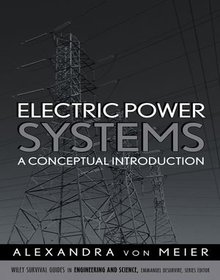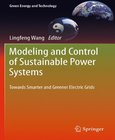Electric Power Systems
A Conceptual Introduction

Book Details:
| Publisher: | Wiley-IEEE Press |
| Series: | Wiley |
| Author: | Alexandra von Meier |
| Edition: | 1 |
| ISBN-10: | 0471178594 |
| ISBN-13: | 9780471178590 |
| Pages: | 328 |
| Published: | Jul 11 2006 |
| Posted: | Nov 19 2014 |
| Language: | English |
| Book format: | |
| Book size: | 3.34 MB |
Book Description:
A clear explanation of the technology for producing and delivering electricityElectric Power Systems explains and illustrates how the electric grid works in a clear, straightforward style that makes highly technical material accessible. It begins with a thorough discussion of the underlying physical concepts of electricity, circuits, and complex power that serves as a foundation for more advanced material. Readers are then introduced to the main components of electric power systems, including generators, motors and other appliances, and transmission and distribution equipment such as power lines, transformers, and circuit breakers. The author explains how a whole power system is managed and coordinated, analyzed mathematically, and kept stable and reliable.Recognizing the economic and environmental implications of electric energy production and public concern over disruptions of service, this book exposes the challenges of producing and delivering electricity to help inform public policy decisions. Its discussions of complex concepts such as reactive power balance, load flow, and stability analysis, for example, offer deep insight into the complexity of electric grid operation and demonstrate how and why physics constrains economics and politics.Although this survival guide includes mathematical equations and formulas, it discusses their meaning in plain English and does not assume any prior familiarity with particular notations or technical jargon. Additional features include:* A glossary of symbols, units, abbreviations, and acronyms* Illustrations that help readers visualize processes and better understand complex concepts* Detailed analysis of a case study, including a Web reference to the case, enabling readers to test the consequences of manipulating various parametersWith its clear discussion of how electric grids work, Electric Power Systems is appropriate for a broad readership of professionals, undergraduate and graduate students, government agency managers, environmental advocates, and consumers.
Download Link:
Related Books:
Modeling and Control of Sustainable Power Systems
Towards Smarter and Greener Electric Grids
The concept of the smart grid promises the world an efficient and intelligent approach of managing energy production, transportation, and consumption by incorporating intelligence, efficiency, and optimality into the power grid. Both energy providers and consumers can take advantage of the convenience, reliability, and energy savings achieved by real-time and intelligent energy management. To this end, the current power grid is experiencing drastic changes and upgrades. For instance, more significant green energy resources such as wind power and solar power are being integrated into the power grid, and higher energy storage capacity is being installed in order to mitigate the intermittency issues brought about by the variable energy resources. At the...
Electric Power Distribution Handbook
2nd Edition
Of the "big three" components of electrical infrastructure, distribution typically gets the least attention. In fact, a thorough, up-to-date treatment of the subject hasnt been published in years, yet deregulation and technical changes have increased the need for better information. Filling this void, the Electric Power Distribution Handbook delivers comprehensive, cutting-edge coverage of the electrical aspects of power distribution systems. The first few chapters of this pragmatic guidebook focus on equipment-oriented information and applications such as choosing transformer connections, sizing and placing capacitors, and setting regulators...
IP Network-based Multi-agent Systems for Industrial Automation
Information Management, Condition Monitoring and Control of Power Systems
This book details the use of the Internet protocol suite and multi-agent systems for the information management, online monitoring, and control of distributed power system substations. It proposes an open architecture for information management and control, based on the concepts of multi-agent systems and mobile agents. Mobile agents are applied to the retrieval and analysis of substation data and to remote operator intervention....
2007 - 2021 © eBooks-IT.org



